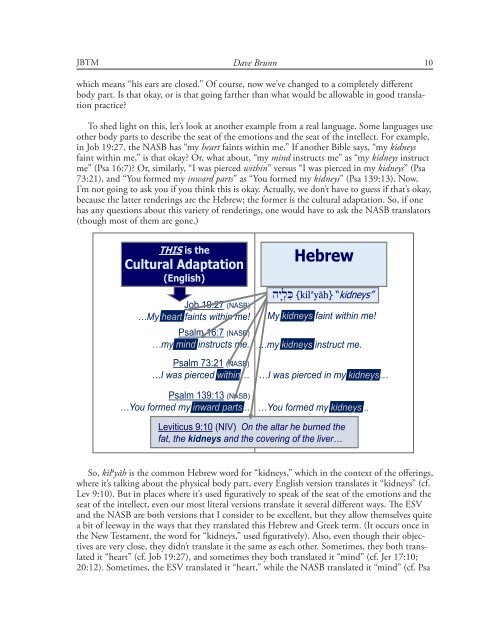Bible Translation as Missions
pTf2MG
pTf2MG
Create successful ePaper yourself
Turn your PDF publications into a flip-book with our unique Google optimized e-Paper software.
JBTM Dave Brunn10which means “his ears are closed.” Of course, now we’ve changed to a completely differentbody part. Is that okay, or is that going farther than what would be allowable in good translationpractice?To shed light on this, let’s look at another example from a real language. Some languages useother body parts to describe the seat of the emotions and the seat of the intellect. For example,in Job 19:27, the NASB h<strong>as</strong> “my heart faints within me.” If another <strong>Bible</strong> says, “my kidneysfaint within me,” is that okay? Or, what about, “my mind instructs me” <strong>as</strong> “my kidneys instructme” (Psa 16:7)? Or, similarly, “I w<strong>as</strong> pierced within” versus “I w<strong>as</strong> pierced in my kidneys” (Psa73:21), and “You formed my inward parts” <strong>as</strong> “You formed my kidneys” (Psa 139:13). Now,I’m not going to <strong>as</strong>k you if you think this is okay. Actually, we don’t have to guess if that’s okay,because the latter renderings are the Hebrew; the former is the cultural adaptation. So, if oneh<strong>as</strong> any questions about this variety of renderings, one would have to <strong>as</strong>k the NASB translators(though most of them are gone.)THIS is theCultural Adaptation(English)Job 19:27 (NASB)…My heart faints within me!Psalm 16:7 (NASB)…my mind instructs me.Psalm 73:21 (NASB)…I w<strong>as</strong> pierced within…Psalm 139:13 (NASB)…You formed my inward parts...Hebrew {} “kidneys”…My kidneys faint within me!…my kidneys instruct me.…I w<strong>as</strong> pierced in my kidneys……You formed my kidneys...Leviticus 9:10 (NIV) On the altar he burned thefat, the kidneys and the covering of the liver…So, kil yāh is the common Hebrew word for “kidneys,” which in the context of the offerings,where it’s talking about the physical body part, every English version translates it “kidneys” (cf.Lev 9:10). But in places where it’s used figuratively to speak of the seat of the emotions and theseat of the intellect, even our most literal versions translate it several different ways. The ESVand the NASB are both versions that I consider to be excellent, but they allow themselves quitea bit of leeway in the ways that they translated this Hebrew and Greek term. (It occurs once inthe New Testament, the word for “kidneys,” used figuratively). Also, even though their objectivesare very close, they didn’t translate it the same <strong>as</strong> each other. Sometimes, they both translatedit “heart” (cf. Job 19:27), and sometimes they both translated it “mind” (cf. Jer 17:10;20:12). Sometimes, the ESV translated it “heart,” while the NASB translated it “mind” (cf. Psa



